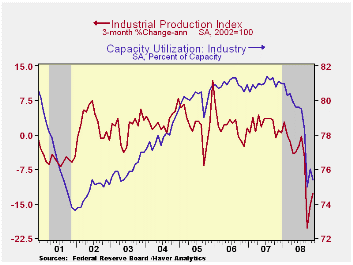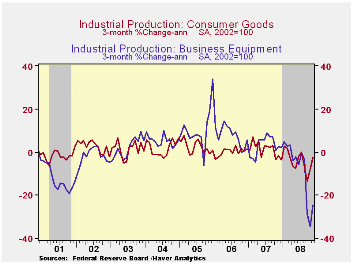 Global| Dec 15 2008
Global| Dec 15 2008U.S. Factory Output Off As Recession Worsens
by:Tom Moeller
|in:Economy in Brief
Summary
Industrial production fell 0.7% during November after a revised 1.5% rise (initially reported at 1.3%) during October. That earlier increase was lifted by recoveries from Hurricanes Gustav & Ike and an end to the strike at Boeing. [...]

Industrial production fell 0.7% during November after a revised 1.5% rise (initially reported at 1.3%) during October. That earlier increase was lifted by recoveries from Hurricanes Gustav & Ike and an end to the strike at Boeing. Last month's decline about matched Consensus expectations.The -5.5% y/y change in industrial output was nearly sharpest drop since the recession of 1982.
The weakness in factory output was worse than the total IP
figure suggested. In fact a 1.4% decline in manufacturing production
was double that of the total and nearly the worst since 1982. Output of
consumer goods fell 0.7% and that pulled the y/y change to -3.8% as
production of motor vehicles & parts declined 2.8% (-21.4%
y/y). Outside of the auto sector the news was quite bad and production
fell 1.4% for a 6.3% y/y decline.
Industrial production in the high-tech sector is in steep recession. Output fell 1.9% during November, about as it did during the prior three months. The figure was pulled lower by a 1.1% (-2.9% y/y) shortfall in the output of computers & peripherals which was the sixth consecutive monthly drop.
Output declines extend well beyond autos and high-tech. Less those two sectors, production fell 1.4% last month for a y/y decline of 6.9%. Indeed, the industry detail further reflected widespread recession in the factory sector. Output of furniture & related products fell 2.9% last month for an 18.8% y/y decline, the largest y/y drop since the recession of 1975. Machinery production continued to reflect recession. The 2.3% (-8.8% y/y) was the third such consecutive drop. Output of electrical equipment production again joined the recession show and fell 2.2% (-5.0% y/y). Apparel output in the "recession-resistant" nondurables sector slipped 0.3% after much heftier declines during the prior two months but it is down just 4.0% y/y. Production of chemicals reversed much of an October increase and fell 3.6% (-8.7% y/y).
Utility output surged 1.6% (-0.3% y/y) with colder temperatures.
Capacity utilization fell to 75.4% after its brief October recovery. It was close to its lowest level since 2003. Utilization in the factory sector of 72.2% also was near the lowest since 2003. Capacity in the factory sector increased a firm 1.7% y/y).
The Financial Tsunami and the Federal Reserve is today's speech delivered by Philadelphia Fed President Charles I. Plosser and it can be found here.
| INDUSTRIAL PRODUCTION (SA, %) | November | October | Y/Y | 2007 | 2006 | 2005 |
|---|---|---|---|---|---|---|
| Total Output | -0.7 | 1.5 | -5.5 | 1.7 | 2.2 | 3.3 |
| Manufacturing | -1.4 | 0.7 | -7.3 | 1.8 | 2.8 | 4.2 |
| Consumer Goods | -0.7 | 1.6 | -3.8 | 1.7 | 0.3 | 2.8 |
| Business Equipment | 3.3 | -2.6 | -7.4 | 3.3 | 10.4 | 7.3 |
| Construction Supplies | -3.3 | -1.4 | -9.7 | -2.5 | 2.2 | 4.5 |
| Utilities | 1.6 | 0.7 | -0.3 | 3.3 | -0.6 | 2.1 |
| Capacity Utilization | 75.4 | 76.0 | 81.1 (Nov.'07) | 81.0 | 80.9 | 80.2 |
Tom Moeller
AuthorMore in Author Profile »Prior to joining Haver Analytics in 2000, Mr. Moeller worked as the Economist at Chancellor Capital Management from 1985 to 1999. There, he developed comprehensive economic forecasts and interpreted economic data for equity and fixed income portfolio managers. Also at Chancellor, Mr. Moeller worked as an equity analyst and was responsible for researching and rating companies in the economically sensitive automobile and housing industries for investment in Chancellor’s equity portfolio. Prior to joining Chancellor, Mr. Moeller was an Economist at Citibank from 1979 to 1984. He also analyzed pricing behavior in the metals industry for the Council on Wage and Price Stability in Washington, D.C. In 1999, Mr. Moeller received the award for most accurate forecast from the Forecasters' Club of New York. From 1990 to 1992 he was President of the New York Association for Business Economists. Mr. Moeller earned an M.B.A. in Finance from Fordham University, where he graduated in 1987. He holds a Bachelor of Arts in Economics from George Washington University.
More Economy in Brief
 Global| Feb 05 2026
Global| Feb 05 2026Charts of the Week: Balanced Policy, Resilient Data and AI Narratives
by:Andrew Cates






